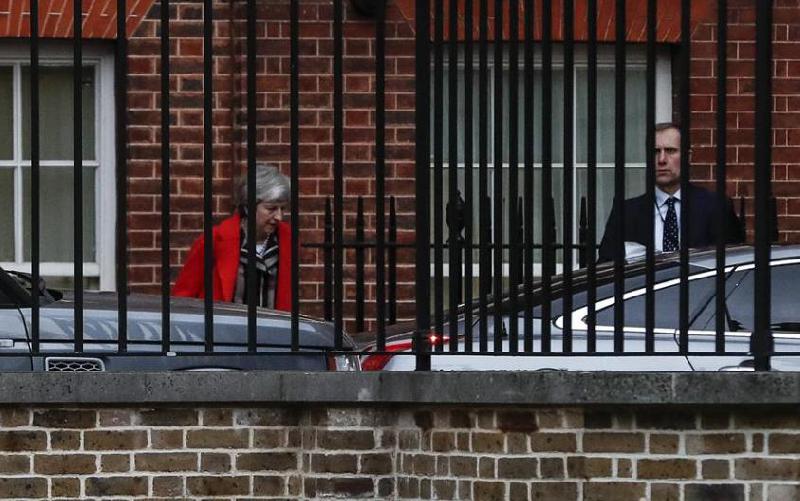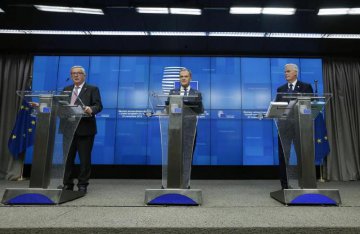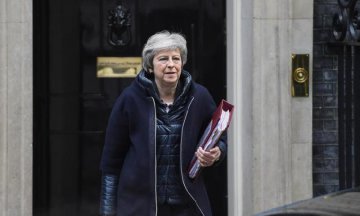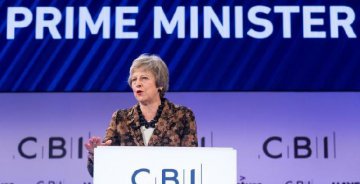
British Prime Minister Theresa May faced possibly the toughest two and half hours of her premiership Monday after waves of British MPs spoke against the deal she had brokered for Britain's departure from the European Union (EU).
AN IMPOSSIBLE MISSION?
Media reports say around 90 of the Conservative backbench MPs have so far said they will vote against her deal, essentially making it an impossible mission unless they change their minds.
Even normally loyal Conservative MPs told May they could not support the agreement and political statement endorsed by EU leaders in Brussels on Sunday.
With confirmation that the so-called Meaningful Vote on Brexit is slated for Dec. 11, May seems to be staring defeat in the face if Monday's reaction across the political divides is the litmus test.
House of Commons officials say the big debate, expected to be bloody fierce, will span five full days, starting on Dec. 4.
A vote against the deal would plunge the whole Brexit scenario into unchartered water, including the prospect of Britain leaving the bloc with no deal, relying on WTO terms for its future trading with its former EU member states.
May defended the deal during an intense and often angry debate in the chamber of the House of Commons, lasting two hours and 36 minutes. Only a handful of MPs supported her deal, while dozens speaking against it.
Still, May insisted the deal was good for Britain, and delivered the result of the June 2016 referendum when Britain voted to end its EU membership.
WHAT IF A NO VOTE?
The prime minister has started the week on a so-called charm offensive to "sell" her deal to the people of Britain. But the big question remains what would happen if, as now seems possible, there is a No vote on Dec. 11?
May has refused to answer when asked if she would quit Number 10 if there is a vote against her deal.
Political experts say options could include Britain asking for an extension of the Article 50 period which set a two-year timetable, ending next March for the so-called divorce. British negotiators could ask for the deal to be tweaked to make it more palatable to British MPs. European Commission President Jean-Claude Juncker insisted in Brussels Sunday that there would no changes to the deal.
Speaking in the House of Commons, May said she did not pretend that either Britain or the EU are entirely happy with the arrangements.
May said there was no alternative deal that honors the government's commitments to Northern Ireland which does not involve an insurance policy over the issue of the border with Ireland.
Looking towards Dec. 11, May said there is a choice the House of Commons will have to make.
"We can back this deal, deliver on the vote of the referendum and move on to building a brighter future of opportunity and prosperity for all our people," she said. "Or this House can choose to reject this deal and go back to square one. Because no-one knows what would happen if this deal doesn't pass. It would open the door to more division and more uncertainty, with all the risks that will entail."
WILL MAY TURN OPINION AROUND?
Jeremy Corbyn, leader of the main opposition Labour Party, told May that ploughing on with a deal opposed by the public and MPs was an act of national self-harm.
Politicians from all of the other parties, the Liberal Democrats, Scottish and Welsh Nationalist parties, the Democratic Unionist Party, all indicated strong opposition.
May's newly appointed Brexit Secretary, Steve Barclay, the third politician to hold the job this year, warned the Dec. 11 date for the big vote would be a challenge.
If Parliament rejects the deal, the country would enter "unchartered waters," Barclay said.
The Guardian newspaper commented Monday night: "The scale of the opposition made it extremely hard to see how she (May) could turn opinion around in time for the vote, now scheduled for a fortnight tomorrow."
The Daily Telegraph meanwhile said Brexiteers from May's Conservative Party said she hadn't a prayer of winning the vote, with one saying her deal's as dead as a dodo, while another MP said May needs a Plan B.
May's Conservative Party holds 316 seats in the House of Commons, relying on support from the 10 Northern Ireland Democratic Unionist Party (DUP) MPs to give her a potential of 326 votes, a majority of one.
If the 10 DUP politicians and the 90 Conservative MPs vote with opposition parties on Dec. 11, it could see May losing by a brutal landslide, leaving her more than 100 short of a majority.
Still, May remained determined to see the deal through. "The British people want MPs to get on with a deal and allow the country to come together," she said.























Latest comments